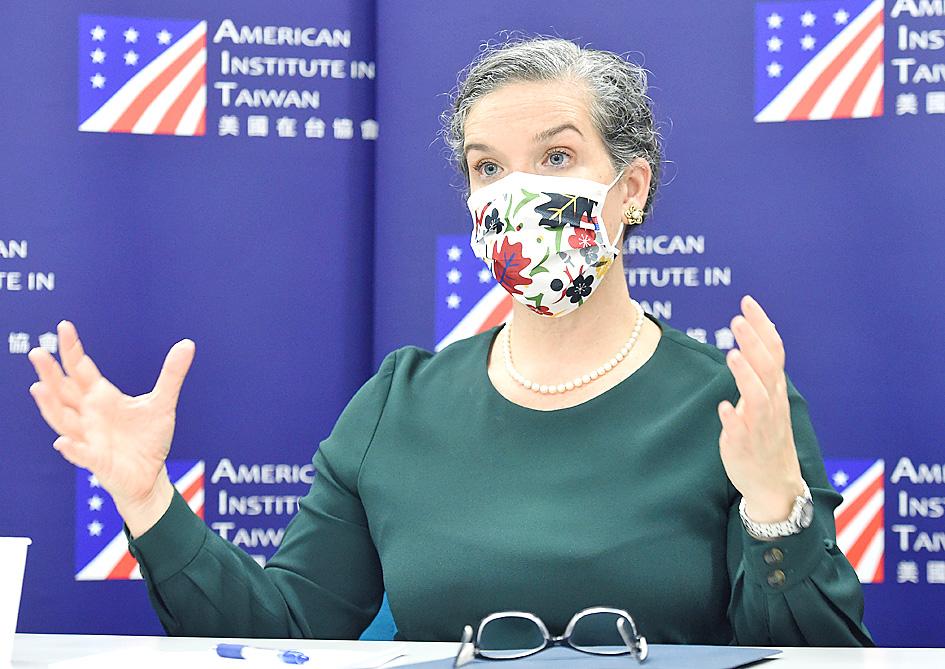The US has a “rock solid” commitment to help Taiwan maintain self-defense capabilities, American Institute in Taiwan (AIT) director Sandra Oudkirk said.
“The PRC’s [the People’s Republic of China] aggressive actions towards Taiwan risk destabilizing what has been a status quo situation in the Taiwan Strait that has contributed to decades of prosperity, stability and security in the Indo-Pacific,” Oudkirk said in an interview with the Chinese-language Liberty Times (the Taipei Times’ sister paper) on Jan. 26.
These actions include flights by the Chinese People’s Liberation Army Air Force into Taiwan’s air defense identification zone, cyberattacks, disinformation campaigns, economic coercion and punitive fines against businesses, she said.

Photo: Liao Chen-huei, Taipei Times
Oudkirk described the commitment to Taiwan as “rock solid,” saying that support comes in terms of “helping Taiwan maintain self-defense capabilities that are adequate to meet the evolving threat environment.”
Security is a key part of the work the AIT does in Taiwan, and security cooperation is governed by Washington’s “one China” policy, she said.
“Support for Taiwan is maybe one of the only things with bipartisan support in the US,” she added.
US policy toward Taiwan is conducted under the Taiwan Relations Act, which includes consideration of the Three Joint Communiques, the “six assurances,” economic effects, people-to-people exchanges and support for Taiwan’s international borders, she said.
When asked about reports that the US plans to accelerate deliveries of F-16V jets to Taiwan, Oudkirk said: “What I can say is that we work very closely with our partners here in Taiwan to move as quickly as we can on defense procurement and deliveries.”
The AIT director spoke highly about a memorandum of understanding signed last year to establish a coast guard working group, saying the deal enabled cooperation in drug interdiction, fisheries enforcement, labor abuses and maritime search-and-rescue.
However, it is not clear if the memorandum could be expanded, as the distance between Taiwan and the US puts constraints on closer forms of cooperation, she said.
“The Taiwan coast guard is an extremely effective maritime law enforcement organization. We are very happy to work with them,” she said.
Oudkirk also spoke of recent tensions between Russia and Ukraine.
Washington “has been clear with the Russian government that it has a choice between diplomacy, discussion, escalation and aggression,” she said. “There is a positive solution available. The other path contains nothing but tragedy and heartbreak for everyone.”
Oudkirk said that while Taiwan, like Ukraine, is threatened by a large, authoritarian and undemocratic neighbor with a powerful military, the difference is that Taiwan has made great strides toward democracy and is “a very large, extremely globally significant economy.”
“The people in Taiwan need to be aware that the US is working to help support Taiwan,” she said, adding that “our partners here at the Ministry of National Defense, in the Presidential Office and at the Ministry of Foreign Affairs are working hard to do their part as well. We will continue to work together.”

Chinese Nationalist Party (KMT) Chairman Eric Chu (朱立倫), spokeswoman Yang Chih-yu (楊智伃) and Legislator Hsieh Lung-chieh (謝龍介) would be summoned by police for questioning for leading an illegal assembly on Thursday evening last week, Minister of the Interior Liu Shyh-fang (劉世芳) said today. The three KMT officials led an assembly outside the Taipei City Prosecutors’ Office, a restricted area where public assembly is not allowed, protesting the questioning of several KMT staff and searches of KMT headquarters and offices in a recall petition forgery case. Chu, Yang and Hsieh are all suspected of contravening the Assembly and Parade Act (集會遊行法) by holding

PRAISE: Japanese visitor Takashi Kubota said the Taiwanese temple architecture images showcased in the AI Art Gallery were the most impressive displays he saw Taiwan does not have an official pavilion at the World Expo in Osaka, Japan, because of its diplomatic predicament, but the government-backed Tech World pavilion is drawing interest with its unique recreations of works by Taiwanese artists. The pavilion features an artificial intelligence (AI)-based art gallery showcasing works of famous Taiwanese artists from the Japanese colonial period using innovative technologies. Among its main simulated displays are Eastern gouache paintings by Chen Chin (陳進), Lin Yu-shan (林玉山) and Kuo Hsueh-hu (郭雪湖), who were the three young Taiwanese painters selected for the East Asian Painting exhibition in 1927. Gouache is a water-based

Taiwan would welcome the return of Honduras as a diplomatic ally if its next president decides to make such a move, Minister of Foreign Affairs Lin Chia-lung (林佳龍) said yesterday. “Of course, we would welcome Honduras if they want to restore diplomatic ties with Taiwan after their elections,” Lin said at a meeting of the legislature’s Foreign Affairs and National Defense Committee, when asked to comment on statements made by two of the three Honduran presidential candidates during the presidential campaign in the Central American country. Taiwan is paying close attention to the region as a whole in the wake of a

OFF-TARGET: More than 30,000 participants were expected to take part in the Games next month, but only 6,550 foreign and 19,400 Taiwanese athletes have registered Taipei city councilors yesterday blasted the organizers of next month’s World Masters Games over sudden timetable and venue changes, which they said have caused thousands of participants to back out of the international sporting event, among other organizational issues. They also cited visa delays and political interference by China as reasons many foreign athletes are requesting refunds for the event, to be held from May 17 to 30. Jointly organized by the Taipei and New Taipei City governments, the games have been rocked by numerous controversies since preparations began in 2020. Taipei City Councilor Lin Yen-feng (林延鳳) said yesterday that new measures by